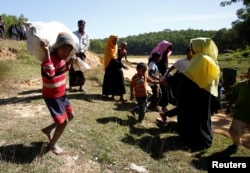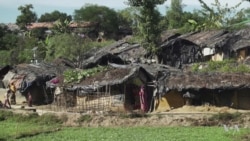At Bangladesh’s Kutupalong refugee camp, thousands of ethnic Rohingya who fled persecution in Myanmar over the last three decades face rough living conditions.
Security checkpoints along the route to the camps make travel difficult and the surge in new arrivals has strained food supplies. But aid agencies and rights groups say the latest outpouring, numbering more than 25,000 Rohingya, faces far worse.
Many of the new arrivals say Myanmar security forces are attacking civilians, and satellite images reinforce claims that entire villages have been burned to the ground.
Nothing to go home to
For recent arrival Gul Jahar, whose three sons went missing during the attack on her village of Keari Para, near Maungdaw, in mid-November, there is nothing left to go home to.
“The [Myanmar] soldiers came to the village and burnt down every house. After the army burnt the houses and destroyed everything, they started capturing the men in the village. Many people got shot and killed and they threw the bodies into the water,” Jahar said as she broke down and started to cry.
After the attacks, Jahar said, the soldiers set fire to everything.
“The [Myanmar] soldiers burnt down all the houses and every thing we had in our village. The rice that we kept in a barn — they burnt it all. We had nothing left.”
Jahar said the military even threw bodies of the victims into the fire, including women and children. She said a total of 15 members of her extended family have died since the crackdown began.
Stories of rape
In addition to the destruction and killings, there have been countless tales of torture and rape attributed to Myanmar security forces.
“Soldiers came to my neighbor’s house at midnight and raped a woman. I saw it with my two eyes. I was hiding and secretly saw what they’re doing. After I saw the incident I couldn’t stay, so I decided to escape and leave everything behind. I didn’t have time to bring any valuables with me,” said Abu Tha Heck, who also escaped from Keari Para village.
Heck said Myanmar security had labeled him a supporter of a rumored insurgency group in the state. He said his life was at risk.
“The [Myanmar] soldier claimed we were working with terrorists and that we supported the rebels who attacked the police. That’s the reason why they have to kill us,” Heck explained.
Traveling with his wife and four of his six children, Heck made the journey by foot to the Naf River with relatives from a neighboring village. Heck paid a boatman about $25 per adult to make the journey across the river.
There was no charge for the small children, he added.
The shop owner and farmer left his house and land behind and still doesn’t know where two of his sons are.
Now in an unregistered camp near Kutupalong, the family is staying in a crowded two-room thatched hut, surviving on rice and food donations from other camp residents.
Along the road to the camps, make-shift transit camps can also be seen to house the overflow of arrivals.
Government asks for proof
As testimonies like these mount, Kyaw Moe Tun, director general of the Myanmar Ministry of Foreign Affairs, said sweeping allegations are not helpful.
But he said the government is ready to work with those who provide hard evidence of the alleged crimes.
“Whoever has [that] kind of information, please bring [it] forward and give us the concrete evidence. Then, the government is ready to look into the matter,” Kyaw Moe Tun said.
Foreign reporters and humanitarian groups have been banned from northern Rakhine state, near the border with Bangladesh, since the crackdown started in October, making it virtually impossible to document any of the attacks on the civilians.
But several journalists are being allowed to travel there this week, although it’s not clear how much access they will be given.







